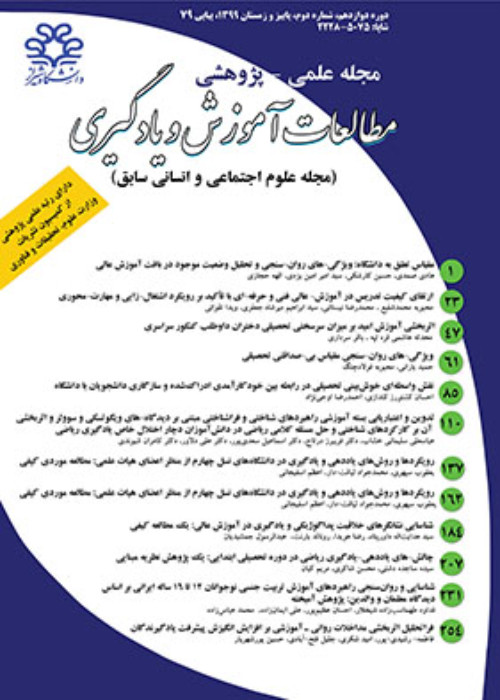The role of perceptions of parenting and academic motivation on critical thinking disposition
Author(s):
Abstract:
Introduction
Students are usually faced with a host of information and stimuli, and in order to use them properly and make the right decisions, they are obliged to evaluate and critique them. Then, they need to accrue critical thinking and process related to it such as critical thinking disposition. So, research about the facts that affect and are related to critical thinking disposition is important. Studies conducted on intrinsic motivation have shown that environment plays a key role in this regard. Family, school and community contexts all have an important role in the formation of critical thinking. Despite the theoretical research conducted on the relationship among the parental perception, motivation and critical orientation, the need to study such relationships in a single study is felt. Family and understandings relating to it have a significant role in the inclination toward critical thinking, and according to SDT theory of motivation and the related processes, this relationship is mediated through motivation. It can, therefore, be mentioned that parental perceptions directly and through motivational processes are related to critical thinking. Research Question: This study was aimed at investigating the relationship between the perception of parenting and motivation with critical thinking disposition based on a causal model. The research question focuses on whether the proposed model fits the data collected from the university students?Method
The statistical population of the research included students of BA level at Ferdowsi University of Mashhad in the academic year 1389-90. The sample included 359 students that were selected through non-proportional stratified sampling. The data collection instruments were California Critical Thinking Disposition (Facione & Facione, 1992, as cited in Nowshadi & Khademi, 2010), Perception of Parents Scale (Grolnick, Ryan & Deci, 1991), and the Work Preference Inventory (Amabile, 1994). Cronbach's alpha reliability of the Perception of Parents Scale in the original source has been reported to vary from 0.79 to 0.86 (Kareshk1, 2008). The Persian version of this scale has a good alpha coefficient for the subscales. In a study, the results of factor analysis with varimax rotation showed that only 40 items with six factors underlay the sacle (Tanhaye Rshvanlv, 2009). Therefore, we can say that scale has good validity and reliability for Iranian students. The reliability and validity of the California Critical Thinking Disposition scale have been verified for Iranian students by Nowshadi and Khademi (2010). The reliability and validity of Work Preference Inventory have also been verified for Iranian students by Shaykholeslami and Razavi (2005). Pearson correlation coefficient and SEM were used for analyzing the data. Result
To test the proposed model, the data were collected and necessary assumptions for SEM such as independence of errors, normality, multivariate normality and multi-co linearity were verified. The results are reported in two parts. The results indicated that there was a significant and positive relationship between the perception of parenting and academic motivation (r=.13, p<0.05). There was also a significant and positive relationship between the perception of parenting and critical thinking disposition (r=.11, p<0.05) and also between motivation and critical thinking disposition (r=.35, p<0.01). The results of structural equating modeling showed that the proposed model fitted the data and that critical thinking disposition is predictable by the perception of parenting and intrinsic motivation (GFI=0.94, RSMEA = 0.05, 2=193.30, df=82, GFI=0.94, AGFI =0.92, 2/df=2.35). In other words, the perception of parenting is related to critical thinking disposition directly and indirectly through intrinsic motivation. The results speak of the direct effect of perceived parental perceptions on critical thinking dispositions (.13), the direct effect of parental perceptions on motivation (.57), the direct effect of motivation on critical thinking dispositions (.55) and the indirect effect of parent's perceptions on critical thinking (.31). This indicates that the indirect pathway of parental perceptions to critical attitudes is a stronger direction.Discussions
In this study, the relationship between parental perceptions and motivations with critical thinking dispositions was examined. The results of structural equation modeling analysis provided support for the research hypothesis; that is, motivation and perceived parental disposition correlate with critical thinking; and there exists an indirect relationship between the perceived parental disposition and critical thinking through intrinsic motivation. Overall, parent's perceptions and motivations are able to predict changes of critical thinking dispositions. In other words, students who have a higher internal motivation tend to have higher critical thinking. These results are consistent with other studies (Jafari sani, Pakmhr & Malekzadeh, 2011; Fan, 2009; Byvrs, 2010; Gayvdt, 2010). Another path through which this model was tested was the relationship between parental perception and motivation. The findings of the research are consisting with others (Fancy & Karshky, 1388; Sbry, 2006; Shaw, 2008; Ryvrs, 2008; Huang, 2007; Gottfried, Fehling, & Gatfyrd, 1994). According to the results, it is important to instruct the parents to help develop critical thinking skills in their children. Given the impact that motivation has on critical thinking, more research is needed to identify how to improve aspects of motivation.Keywords:
Language:
Persian
Published:
Studies in Learning & Instruction, Volume:5 Issue: 1, 2013
Pages:
47 to 64
magiran.com/p1253379
دانلود و مطالعه متن این مقاله با یکی از روشهای زیر امکان پذیر است:
اشتراک شخصی
با عضویت و پرداخت آنلاین حق اشتراک یکساله به مبلغ 1,390,000ريال میتوانید 70 عنوان مطلب دانلود کنید!
اشتراک سازمانی
به کتابخانه دانشگاه یا محل کار خود پیشنهاد کنید تا اشتراک سازمانی این پایگاه را برای دسترسی نامحدود همه کاربران به متن مطالب تهیه نمایند!
توجه!
- حق عضویت دریافتی صرف حمایت از نشریات عضو و نگهداری، تکمیل و توسعه مگیران میشود.
- پرداخت حق اشتراک و دانلود مقالات اجازه بازنشر آن در سایر رسانههای چاپی و دیجیتال را به کاربر نمیدهد.
In order to view content subscription is required
Personal subscription
Subscribe magiran.com for 70 € euros via PayPal and download 70 articles during a year.
Organization subscription
Please contact us to subscribe your university or library for unlimited access!



